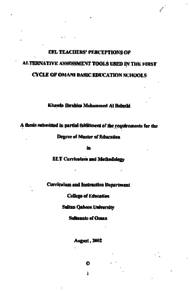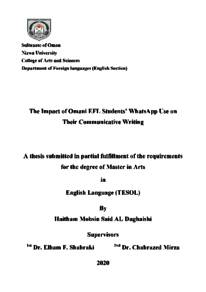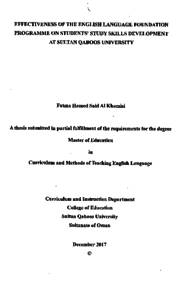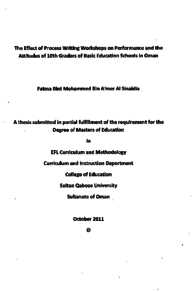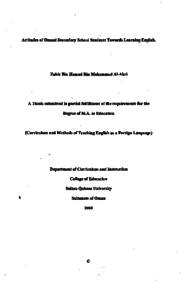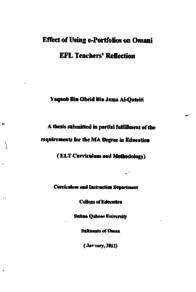وثيقة
EFL teachers' perceptions of alternative assessment tools used in the first cycle of Omani basic education schools
الناشر
Sultan Qaboos University
ميلادي
2002
اللغة
الأنجليزية
الملخص الإنجليزي
The present study aims at investigating EFL teachers' perceptions of alternative assessment tools used in the first cycle of Omani Basic Education schools and determining the differences in teachers' perceptions according to qualification, nationality, years of teaching experience, years of teaching experience in Basic Education schools, and those differences due to the different regions of the Sultanate of Oman.
The population of the study consists of all EFL teachers who teach in the first cycle of Basic Education schools. The sample of the study is drawn from eight regions of the Sultanate of Oman. It comprises one hundred-twenty teachers representing about twenty five percent (25%) of the population. The main research instrument was a questionnaire, which consisted of statements that the subjects were asked to rate using the given scales.
The following are the major findings of this study:
Teachers perceived alternative assessment tools used in the first cycle of Basic Education schools adequate in some aspects such as sensitizing them to the aims of each unit. Furthermore, alternative assessment tools are viewed to be better for evaluating learners in a more natural and less stressful way, although teachers perceived traditional tests to be better in other aspects. Regarding the design of the tools used, teachers believed that profile charts used in the first cycle of Basic Education schools are well designed.
As for the difficulties teachers face, alternative assessment tools are thought to be time-consuming and not fair with shy children. Teachers reported that parents do not understand the results of their children's reports. Although teachers are in need for on-going support and training to improve their use of alternative assessments, they reported that they have become competent in using them through experience.
Regarding their suggestions for improving these tools, teachers recommended training learners in self-assessment as part and parcel of their training to become better language learners. They also suggested reporting children's results to their parents at the end of each unit in the form of specific comments on each skill rather than in terms of grades.
Data analysis revealed that there were significant differences between teachers' perceptions due to qualification, nationality, years of teaching experience, and regions. On the other hand, there were no significant differences between their perceptions due to years of teaching experience in Basic Education.
In light of these findings, there are a number of recommendations for student assessment and teacher training and recommendations for further research.
المجموعة
URL المصدر
قالب العنصر
الرسائل والأطروحات الجامعية

